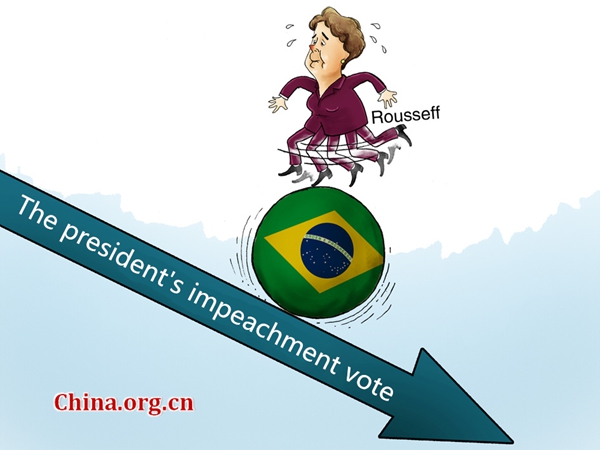What does Brazil's deepening political crisis mean for the world?
- By Niranjan Sahoo
 0 Comment(s)
0 Comment(s) Print
Print E-mail China.org.cn, May 4, 2016
E-mail China.org.cn, May 4, 2016
|
[By Zhai Haijun/China.org.cn] |
On April 17, some 342 of 513 deputies from the lower house of Brazil's Congress made an unprecedented decision to impeach President Dilma Rousseff. The impeachment motion now moves to the Senate for its voting. The impeachment process is going to be a long process and has badly polarized the country that is currently grappling with an unprecedented economic meltdown.
The impeachment battle is seen as an open war between two ideologies; one represents the right-wing, affluent and middle class that has hated the ruling Workers' Party (PT) and its President Dilma Rousseff, and the other camp represents the voice of millions of working class people living in thousands of favelas, or slums, the countryside and the proven beneficiaries of the PT's pro-poor Bolsa Familia and other anti-poverty schemes.
The ongoing political slugfest which closely resembles Thailand's Red Shirts versus Yellow Shirts street fights is driving this South American powerhouse into uncertain territory with serious economic and geopolitical costs. Of course, Brazil is no Thailand. It is the regional powerhouse in South America's political and regional stability. In short, Brazil's current crisis has high stakes for the region and the world.
What is fuelling the popular anger?
The current political turmoil has been greatly influenced by a series of revelations from the big ticket Petrobas scandal popularly dubbed as Lava Jato (Operation Car Wash) involving many top politicians of the ruling coalition. While there is no direct evidence against Rousseff's involvement in the scam, her name is being dragged through the mud because she headed Petrobas from 2003 to 2010, a period which witnessed many instances of irregularity.
However, the Lava Jato scandal is not the sole reason for the present turmoil leading to the possible impeachment of Rousseff. In fact, several law makers from the opposition parties including the speaker of the lower house are currently being investigated for graft allegations. The popular angst against Rousseff stems from the ongoing economic crisis and her poor handling of the economy.
Brazil's budget deficit has ballooned to a record 11 percent of the country's gross domestic product since 2014. Grappling with the worst recession since the 1930s, Brazil's inflation and unemployment rate have expanded to an all time high. With commodity prices down to their lowest point while slowing demands from China are pinching the economy hard, there is palpable frustration on the streets as people expect more growth retarding austerity measures to fight the fiscal deficit and a possible hike in public transport and energy bills. In fact, more than the corruption, it is the collapse of stable income, the middle class anxiety of seeing no radical measures from a centre-left government known for its spend thrift habits and pro-poor subsidies, that has brought millions of people to the streets to oust a lackluster Rousseff. Some 3 million people took the streets in nearly 200 cities, which illustrates the popular dissatisfaction with the current coalition's handling of graft and economy.
Where and in which direction is the country headed? Brazil's political system is no stranger to big ticket scandals and political slugfests. There are at least two major occasions in which Brazil witnessed major political upheaval and strong street protests leading to a military coup and a forcible unseating of presidents. For instance, two past presidents Getulio Vargas and Joao Goulart who were seen representing Brazil's elite and had the backing of the United States faced revolts from the favelas and working class. While President Vargas was driven to commit suicide, President Goulart was unseated by a military coup in 1964. Paradoxically, the present one is anchored by the elites, middle class and political class opposed to the pro-poor ideologies of the Workers' Party. One has to wait and watch how the present movement led by country's elites will unfold.






